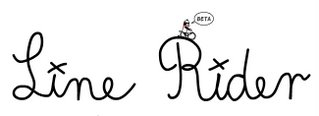
This kept me entertained for way too long.
Apparently, there's several of us out there who are this retarded.
From the NYT:
Crazy for Line Rider
Every now and then, the Web provides a showcase for talent in corners where you never would have expected to find it.
Consider, for example, the amazingly simple, but overwhelmingly addictive Flash-based game/simulation/physics experiment known as Line Rider.
You start on a blank white screen. You draw lines—hills, ramps, valleys—with a pencil tool. When you click Play, a tiny, weird, funny little guy on a sled gets dropped onto the uppermost line you drew—and gravity takes it from there. Make your lines too steep, and he wipes out. Make them too shallow, and he runs out of momentum and stops. Cross them in just the right way, and the simulation goes nuts and spits him forcefully hundreds of feet in the air.
It’s spawned an entire mini-subculture of Line Rider nuts, who spend hours drawing elaborate fantasyscapes for their little sledder guys, and then capturing the results (either with a screen-capture program or even with a camcorder filming the screen) and posting them on YouTube.
It looks easy. But it’s actually darned difficult, especially because there’s no eraser tool, and lines you draw from the left and from the right behave differently.
Still, I’m almost sorry to hear that a new version is in the works with an eraser tool. The difficulty of creating a great course using today’s crude tools makes you even more amazed at the genius of the best Line Rider artists’ work. Check out these, for example:

One of the most famous, thanks to its ski-village motif.
A spectacular underwater theme, with an amazing finish.
Anyone up for caving? Tragic ending, though.
There’s a downloadable, standalone version here, and there are spinoff versions, apparently all by the same guy, called LineFlyer (motorcycle), Jeep Flyer (Jeep), and Line Boarder (snowboard).
But none of them quite match the quirky, funny strangeness—and timekilling potential—of the original, not-quite-finished Line
Videos of success
I had no success...

11 comments:
Hey I think I saw this on late-night tv infomercials in between the "Poor Dad, Poorer Dad, Get Rich Now using Hokem for a limited time only $79.95" and "Samurai Ginsu Chef pottery cookware for $19.95".
Interesting. Amusing. Somethingsomethingwhatever. ;)
Google Will Eat Itself
I'm not even going to look at the website. I already have far too many distractions.
Two words...
Mentos, Coke.
This thing nearly drove me to madness last night. Apparently drawing a straight line is not my forte’. I actually came across this game/addictive-life-waster a few weeks ago. I wasn’t going to post it because I thought it was a form of cruel and unusual punishment. But then I saw the write-up about it in the NYT and figured if they could give America one more reason not to do something constructive, then who am I not to share it also?
And Alex, I checked out the Google will eat itself place a couple weeks ago. I’m fascinated by all things Googly. I’m still not quite sure what they’re all about, but it was pretty interesting.
Did you watch the scary little video “EPIC”?
Now I'm a likin' EPIC. If you notice towards the end when EPIC casts its' shadow, it uses the E-(pi sign)-C. Cool vid.
I saw the Google Will Eat Itself (GWEI) on the DW news special (German tv on LinkTV) on search engines and it pretty much said the same thing with real-life examples of how people's privacy is being compromised.
The GWEI is the brainchild of a couple of people what use clicks (could be fraud) using internet robots for making money, which they then reinvest in Google stock (wash, rinse, repeat).
According to the program, the scary thing is that advertisers pay to advertise but instead of paying for sales, they pay for clicks that link over to their site, but may not buy anything from their sites.
Repeat.
Advertisers pay only to link to their sites but that don't result in sales.
It said that Google issues refund checks to advertisers on a monthly basis for a couple of thousand dollars, even though it could be much much higher.
Google doesn't share any of that information with anyone.
If that business model is true, it's spelled b-u-b-b-l-e.
I saw that Line Rider in a class on Flash and the teacher was explaining the steps you need to take to create something like that it was pretty cool.
The GWEI sounds like a pyramid scheme to me, I doubt Google will pay off for unveriefied ads and especially not sell stock for it, it maybe all just digital money but I doubt that the accountants and stockbrokers are going to just let it pass.
Ok Alex, explain the shadow that the word EPIC was casting again.
I saw it, stared at it, and couldn't figure out why it was wrong or what it was trying to say.
And why is it a bad thing for advertisers to be paying to link to their site, even if nothing is puchased by the clicker?
They still get their store
advertised, and the click-ee gets money for having the store's link on their site.
I must be missing a step.
Moogirl.
EPIC...
Somewhere close to the end of the video, there's a spot where the word "EPIC" looks like it's casting a shadow with the letters looking normal and then the shadow part looks like the letters are upside down as it would if it was a shadow. Except the middle two letters are an upside down pi symbol, π.
Google advertising...
It's like all advertising. The quest for the holy grail to find out how and where to best spend advertising dollars to get the best return on advertising money. It's a cost of doing business.
However, in the internet world the more effective way is to reward the referrer when a sale occurs, usually with a percentage and that referral has a code attached to it to identify the referrer (there are sites that have made pretty good money using the referral model and the best of these pull in anywhere from $50K/yr to $500K+/yr).
In physical stores (instead of virtual stores), all traffic and little or no sales is bad. Just like sending clicks to a virtual site and paying for unconsummated sales is not a good idea.
It's prone to abuse when people create little "bots" to increase the number of clicks falsely (click fraud) for which the they get paid, but which means that advertisers are getting defrauded by paying for false traffic to their sites if they're only paying for clicks and not sales.
As long as Google has been around, people have figured out how to "game" the system to get paid for false referrals.
The early business models for internet advertising included a rate plus a percentage fee based on traffic referred to a business' site. As far back as 2 years ago, some advertisers were getting hit with $20K/mth in advertising bills in some of the early business models because people were gaming the system.
I believe there is currently a $90M lawsuit against Google in the US to settle click fraud claims, and this was mentioned in the DW news show.
Ohhhh I get it,P-pi sign-C,EPIC.
DUH! I knew the shadow wasn't right when I saw it, I just couldn't figure out why.
And Google? I think they can afford it.
Post a Comment